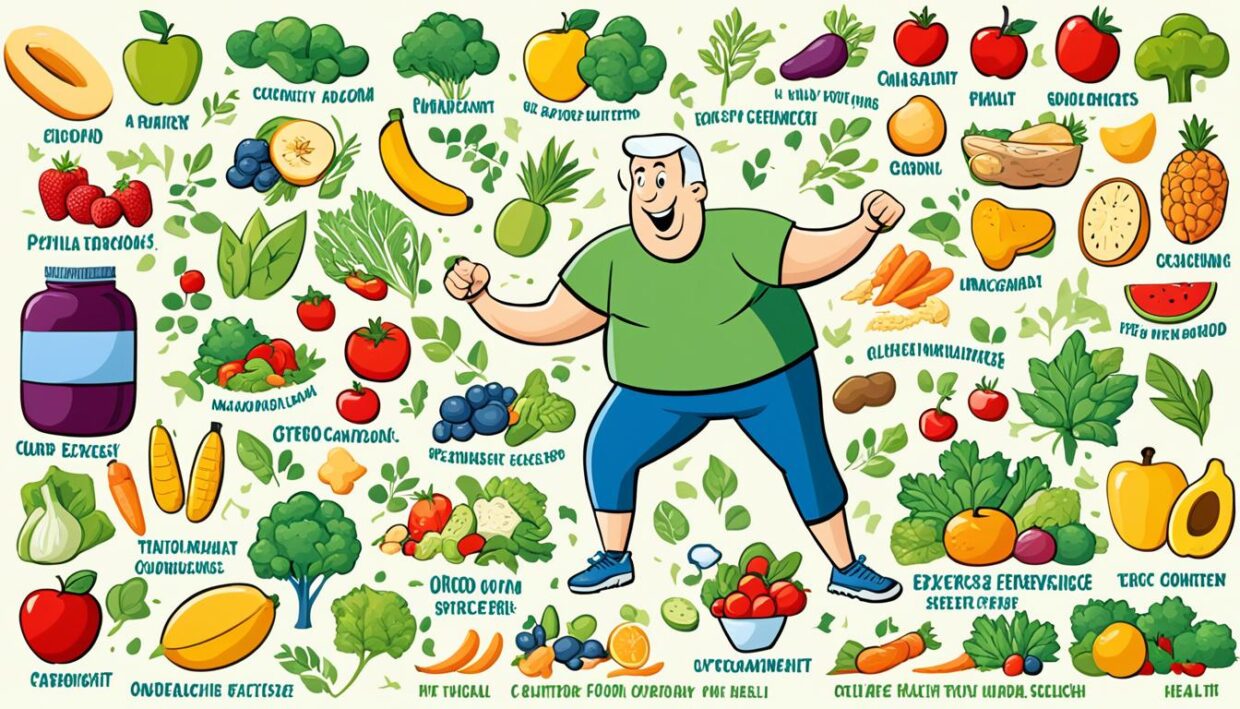
“It is health that is real wealth and not pieces of gold and silver.” – Mahatma Gandhi. This profound wisdom emphasizes the crucial role that health plays in our overall well-being and lifestyle. In our fast-paced world, achieving optimal health is more important than ever. The synergy of nutrition, fitness, mental health, and preventive care creates a vibrant, fulfilling life. By exploring these elements, we can uncover practical strategies to enhance our health and wellness.
Key Takeaways
- A balanced diet is fundamental for maintaining health and wellness.
- Regular physical activity significantly reduces the risk of chronic diseases.
- Mental health plays a vital role in overall wellness and should not be overlooked.
- Routine check-ups can help prevent health issues before they arise.
- Quality sleep is essential for optimal bodily and cognitive function.
Understanding the Importance of Health
Health represents a cornerstone of a fulfilling life, influencing every aspect of daily living. Prioritizing good health leads to significant benefits, including improved productivity and a lower risk of chronic illnesses. Research shows that over 6 out of 10 Americans suffer from chronic health conditions, underscoring the urgent need for effective healthcare approaches. Better health literacy can prevent nearly 1 million hospital visits annually and save over $25 billion in costs, according to a UnitedHealth Group report.
The definition of health has evolved since 1948 when the World Health Organization described it as a state of complete physical, mental, and social well-being. This broad perspective highlights that health encompasses more than merely avoiding disease; it involves fostering an environment conducive to overall well-being. Lifelong commitments toward wellness include regular health screenings, effective stress management, and healthy lifestyle choices.
A range of factors influences personal health, from genetic predisposition to educational attainment. People with low socioeconomic status often face barriers to healthcare access, leading to heightened stress and limited health literacy skills. A study by the U.S. Department of Education noted a stark correlation between reported health status and literacy, revealing that adults with the worst health typically possess fewer literacy skills.
Cultural influences also play a vital role in promoting health. For instance, individuals adhering to a Mediterranean diet experience a lower mortality rate and enjoy a reduced risk of conditions like type 2 diabetes. Emphasizing preventive healthcare and informed decision-making can lead to healthier populations. The emphasis on prevention becomes increasingly essential as healthcare costs in the United States surged to $3.5 trillion in 2017.
Overall, investing in health and well-being emerges not merely as a personal journey but as a societal imperative to enhance the quality of life for all. Robust community health programs empower people to take control of their health, creating a ripple effect of improved wellness across populations.
| Factor | Impact on Health |
|---|---|
| Genetics | Predispose individuals to various health conditions |
| Education | Enhances health literacy and decision-making |
| Socioeconomic Status | Affects access to healthcare resources |
| Cultural Practices | Influences dietary choices and lifestyle habits |
| Community Programs | Empower individuals to manage their health better |
Nourishing Your Body with Nutrition
A well-rounded diet serves as a foundation for optimal health. Emphasizing a variety of nutrient-dense foods enhances overall well-being while meeting nutritional needs. Focusing on colorful fruits and vegetables, whole grains, and healthy fats significantly promotes a balanced and nourishing diet.
Colorful Fruits and Vegetables
Incorporating at least five servings of colorful fruits and vegetables daily can greatly influence health. These foods are rich in essential vitamins, minerals, and dietary fiber. Fruits like pomegranates provide phytonutrients that support women’s health and help reduce inflammation. Leafy greens contribute to the recommended 80% nourishing diet guideline, proving vital in maintaining overall health through their well-documented nutritional profile.
Whole Grains for Sustained Energy
Whole grains such as quinoa, brown rice, and oats play a crucial role in providing sustained energy. They are high in fiber, which supports digestive health and helps manage weight effectively. Aim for the recommended daily intake of fiber, around 25 grams for adult women and 38 grams for adult men. A diet rich in whole grains can also aid in controlling blood sugar levels and reducing sugar cravings.
Incorporating Healthy Fats
Healthy fats are essential for heart health and overall well-being. Sources like avocados, olive oil, and fatty fish provide omega-3 fatty acids that link to improved mood stability and cognitive function. Including these fats in your diet can help combat inflammation and support various health benefits. Registered dieticians can assist in creating personalized nutrition plans that include these beneficial fats for individual health needs.

| Food Type | Benefits | Recommended Serving |
|---|---|---|
| Colorful Fruits | Rich in vitamins, minerals, and antioxidants | 5 servings daily |
| Whole Grains | Provides sustained energy and fiber | At least 3 servings daily |
| Healthy Fats | Supports heart health and cognitive function | 2-3 servings daily |
| Leafy Greens | High in nutrients and reduces inflammation | 2-3 servings daily |
| Nuts and Seeds | Source of healthy fats and protein | 1 ounce (about a small handful) |
The Role of Exercise in Enhancing Wellness
Regular exercise is a cornerstone of overall health, playing a vital role in maintaining fitness and preventing obesity. Engaging in physical activity not only helps manage weight but also significantly reduces the risk of various chronic diseases. The U.S. Department of Health and Human Services recommends that adults aim for at least 150 minutes of moderate aerobic activity or 75 minutes of vigorous aerobic exercise each week to reap these health benefits.
Studies indicate that consistent physical activity can lower the risk of early mortality associated with leading health threats, including heart disease and certain forms of cancer. Particularly, exercise is critical in decreasing risks like coronary artery disease by effectively managing blood pressure, cholesterol, and triglyceride levels.
Exercise does not only benefit physical health but also enhances mental wellness. It plays a role in reducing anxiety, managing stress, and lowering depression risk. Regular physical activity releases brain chemicals that lead to improvements in mood, making individuals feel happier and more relaxed.
Additionally, engaging in activities that focus on strength and flexibility aids in muscle retention and bone density maintenance, which is essential for both younger and older populations. For seniors, incorporating balancing exercises reduces the risk of falls.
Quality of sleep also improves with regular exercise, allowing individuals to fall asleep more quickly and enjoy deeper sleep. Beyond sleep, exercise can heighten sexual health by potentially lowering the risk of erectile dysfunction in men and enhancing sexual arousal in women.
In summary, incorporating regular exercise into daily routines dramatically supports both physical and mental health. The following table summarizes some key benefits associated with maintaining an active lifestyle:
| Benefit | Description |
|---|---|
| Weight Management | Helps prevent excess weight gain and keeps off lost weight. |
| Cancer Risk Reduction | May lower risks of specific cancers such as colon and breast cancer. |
| Mental Health | Improves mood, reduces stress, and lowers anxiety and depression risks. |
| Bone and Muscle Strength | Enhances muscle mass and bone density, crucial for all ages. |
| Improved Sleep Quality | Facilitates quicker sleep onset and deeper sleep. |
| Heart Health | Boosts HDL cholesterol and lowers unhealthy triglycerides. |

Strategies for Effective Weight Management
Effective weight management requires a comprehensive approach that emphasizes a healthy lifestyle and fitness. Understanding the balance between calorie intake and physical activity is essential for sustainable results. Healthy eating patterns play a significant role in this process, steering clear of crash diets that often lead to short-term fixes.
A well-structured meal plan can aid in portion control, allowing individuals to enjoy a variety of foods while managing their weight. Here are some actionable strategies:
- Consume nutrient-rich foods that provide essential vitamins and minerals, enhancing overall well-being.
- Engage in at least 150 minutes of moderate-intensity physical activity each week to maintain a healthy weight.
- Incorporate strength training exercises to build muscle, which helps manage weight as muscle burns more calories at rest.
- Monitor caloric intake by understanding the factors that influence it, such as age, sex, and activity level.
- Focus on consistent exercise routines, combining aerobic activities with resistance training for optimal benefits.
Educating oneself about personal body composition and understanding how weight affects health can lead to better decisions regarding fitness and nutrition. For older adults, maintaining a healthy weight range is crucial, as elevated body mass index (BMI) may increase the risk of chronic conditions such as heart disease and diabetes. Conversely, unintentional weight loss can signal serious health issues and should prompt immediate consultation with healthcare professionals.
Incorporating daily physical activities like walking, gardening, or dancing can significantly support a healthy lifestyle. The key is to focus on gradual progression in physical activity levels, ensuring that it aligns with personal fitness levels. Breaking down exercise routines into shorter segments can enhance compliance and promote regularity.
The following table summarizes the recommended strategies for effective weight management:
| Strategy | Description |
|---|---|
| Nutrient-rich Diet | Focus on foods that provide essential nutrients while managing caloric intake. |
| Physical Activity | Engage in at least 150 minutes of moderate-intensity workouts weekly. |
| Strength Training | Incorporate resistance exercises to enhance muscle mass and metabolism. |
| Portion Control | Use meal planning techniques to control portions and avoid overeating. |
| Health Monitoring | Regular check-ins with healthcare providers to assess weight and health status. |

Boosting Your Immune System Naturally
A strong immune system plays a vital role in maintaining overall health. To enhance this defensive mechanism, a diet rich in essential nutrients is necessary. A combination of vitamin-rich foods and proper hydration significantly supports immune function, ensuring your body is well-equipped to fend off illnesses.
Vitamin-Rich Foods
Incorporating a variety of fruits, vegetables, and proteins into your nutrition can provide the essential vitamins required for a robust immune system. Key nutrients include:
- Vitamin C: Recommended daily intake is 75 mg for women and 90 mg for men, with a caution against exceeding 2,000 mg. Red bell peppers deliver nearly 3 times more vitamin C per ounce than Florida oranges, making them an excellent choice.
- Vitamin E: Adults need about 15 mg daily. A serving of half a cup of almonds meets 100% of this requirement.
- Zinc: The daily recommended intake is 11 mg for men and 8 mg for women. Important to note, too much zinc can inhibit immune function.
- Vitamin B6: Found in chicken and turkey, it helps reduce inflammation and improve cold symptoms.
- Selenium: One ounce of sunflower seeds provides nearly half of the daily requirement for adults.
- Papaya: This fruit offers 100% of the daily recommended amount of vitamin C and contains the digestive enzyme papain, known for its anti-inflammatory effects.
- Green tea: Contains powerful antioxidants, such as epigallocatechin gallate (EGCG), which may support immune health.
Hydration for Optimal Functioning
Proper hydration is crucial for nutrient absorption and immune cell circulation. Water aids in flushing out toxins and helps blood and lymph flow, both integral to the immune system. To support overall health and immunity:
- Aim for at least eight 8-ounce glasses of water per day.
- Incorporate hydrating foods like cucumbers and watermelon into your diet.
- Limit beverages that contain caffeine or alcohol, as they can be dehydrating.

Maintaining adequate hydration alongside a balanced, nutrient-rich diet elevates immune function and enhances your overall health. Focusing on natural food sources ensures your body absorbs vitamins and minerals more effectively than through supplements, except for specific deficiencies identified under the guidance of healthcare providers.
| Vitamin | Recommended Daily Intake | Food Sources |
|---|---|---|
| Vitamin C | 75 mg (women), 90 mg (men) | Red bell peppers, papayas, oranges |
| Vitamin E | 15 mg | Almonds, sunflower seeds |
| Zinc | 8 mg (women), 11 mg (men) | Meat, shellfish, legumes |
| Vitamin B6 | 1.3 mg | Chicken, turkey, fish |
| Selenium | 55 mcg | Sunflower seeds, brazil nuts |
Maintaining Mental Health and Well-being
Ensuring strong mental health remains vital for overall wellness. Strategies for effective stress management contribute significantly to emotional stability. Various techniques can help individuals navigate difficult times, fostering resilience and enhancing the capacity to cope with daily challenges.
Stress Management Techniques
Implementing practical stress management techniques can improve mental health. Regular physical activity not only enhances well-being but also boosts self-esteem. Engaging in exercises can create positive brain chemistry, making it easier to manage daily stresses. Immersing oneself in activities that bring joy, such as cooking or spending time with pets, serves as a protective measure against feelings of anxiety.
Practicing Mindfulness and Meditation
Mindfulness practices can significantly elevate mental health. By concentrating on the present moment, individuals can gain deeper insights into their thoughts, feelings, and surroundings. Incorporating meditation into daily routines allows for emotional clarity and improved attention span. These practices can foster deeper connections with self and others, promoting a sense of belonging.

| Activity | Benefits for Mental Health |
|---|---|
| Physical Activity | Boosts self-esteem and improves brain chemistry |
| Mindfulness | Enhances attention to the present and emotional clarity |
| Enjoyable Hobbies | Promotes joy and reduces stress |
| Learning New Skills | Improves self-confidence and connects with others |
| Acts of Kindness | Fosters positive feelings and reinforces connections |
Importance of Regular Health Check-ups
Regular health check-ups play a pivotal role in the domain of preventive healthcare. These appointments enable healthcare professionals to detect potential health issues before they escalate into serious problems. With early detection, individuals have the best chance for timely treatment, which can prevent complications down the line.
Engaging in routine health check-ups offers a multitude of benefits:
- Reduces the risk of illness by identifying dangerous conditions early.
- Increases opportunities for effective treatment and potential cures.
- Limits complications by keeping an eye on existing health concerns.
- Enhances longevity and overall wellness.

The preventive health screening checklist for adults should include annual well visits, assessments of family history, monitoring of blood pressure, and body mass index (BMI) checks. Other essential components involve physical exams, a variety of preventive screenings, counseling, and cancer screenings that are appropriate for specific demographics.
Regular health check-ups empower individuals to stay informed about the latest medical advancements, fostering a strong partnership with their healthcare providers. This partnership not only streamlines treatment processes but also contributes to reducing healthcare costs by preventing the need for more expensive services in the future. While not all patients need annual check-ups, those in at-risk categories should prioritize these visits for vital health monitoring.
For older patients or those with Medicare coverage, the annual wellness visit often incurs no copay, making it easier to prioritize wellness without financial burden. Establishing baselines for vital health indicators through these visits allows for effective tracking of any changes, crucial for early detection of health issues.
The peace of mind gained from regular health check-ups enhances mental well-being. Knowing that proactive measures are being undertaken to manage health creates a more positive outlook on life. By leading through example, individuals can encourage others in their community to prioritize their health and wellness, creating a broader culture of preventive healthcare.
Building a Preventive Healthcare Routine
Establishing a preventive healthcare routine plays a crucial role in enhancing overall health. With global life expectancy on the rise, preventable morbidity and mortality continue to be major issues. Chronic non-communicable diseases, such as cardiovascular disease, cancer, and diabetes, stand out as leading preventable causes of death, highlighting the necessity for proactive measures.
Effective prevention strategies can significantly reduce the incidence of illnesses. Primary prevention focuses on the promotion of healthy lifestyles through balanced diets and regular exercise. Engaging in these activities strengthens the body and diminishes the risk of disease. Secondary prevention emphasizes early detection through screenings, aiding in the timely identification of conditions before they escalate into serious health threats.
Among adults, a disappointing 8% over the age of 35 have received recommended preventive care. Routine screenings for heart disease, diabetes, and various cancers form the backbone of preventive healthcare. Those at increased risk due to family history should pursue more proactive screening measures. Children benefit from preventive health services as well, including well-child visits and immunizations, which are typically covered in full by insurance plans.
The table below summarizes various preventive healthcare measures, their focus, and associated benefits:
| Type of Prevention | Focus | Examples | Benefits |
|---|---|---|---|
| Primary Prevention | Preventing disease onset | Health promotion, healthy eating | Reduces disease risk |
| Secondary Prevention | Early detection | Screenings for diabetes, cancers | Stops disease progression |
| Tertiary Prevention | Managing established diseases | Rehabilitation, pain management | Enhances quality of life |
| Primordial Prevention | Addressing root causes | Social determinants, healthy environments | Prevents risk factor development |
| Quaternary Prevention | Avoiding unnecessary interventions | Evaluating treatment necessity | Minimizes medical risks |
The connection between preventive healthcare and long-term wellness is clear. By actively participating in health-promoting behaviors and seeking regular screenings, individuals can significantly improve their chances of living healthier lives free from preventable illnesses.

Creating a Balanced and Flexible Diet
Embracing a balanced and flexible diet is crucial for sustainable health and well-being. This approach focuses on the incorporation of various food groups, allowing individuals to enjoy their meals while meeting their nutritional needs. Avoiding restrictive diets fosters a healthier relationship with food, promoting long-term success in achieving fitness goals.
Avoiding Restrictive Diets
Restrictive diets can often lead to feelings of deprivation, making it harder to maintain healthy eating habits. They frequently categorize foods as “good” or “bad,” creating unnecessary stress and confusion. Opting for a flexible dieting framework supports weight loss at a scientifically validated rate of 1-2 pounds per week. This approach allows for a varied intake of foods, making it easier to adhere to one’s nutrition objectives.
Meal Planning for Success
Effective meal planning is essential for making informed choices that align with one’s dietary requirements. It involves pre-selecting meals and snacks to ensure a balanced intake of macronutrients—carbohydrates, proteins, and fats. Following the U.S. Department of Agriculture (USDA) guidelines aids in achieving a recommended macronutrient distribution, ensuring carbohydrates constitute 45-65%, proteins 10-35%, and fats 20-35% of total daily calories.
Incorporating meal planning into daily routines not only helps in tracking calories and macros with popular apps like MyFitnessPal but also promotes improved food choices. By preparing meals in advance, individuals can resist the lure of processed foods, ensuring a diverse range of nutrition within their diet.
| Macronutrient | Recommended Percentage |
|---|---|
| Carbohydrates | 45% – 65% |
| Protein | 10% – 35% |
| Fat | 20% – 35% |

Flexible dieting proves beneficial for various individuals, including those managing diabetes, as it aligns with insulin management strategies. Understanding personal dietary needs allows for ongoing adjustment of macronutrient ratios, supporting lifestyle choices while achieving desired health outcomes.
Physical Activity: Finding What Works for You
Engaging in regular physical activity plays a crucial role in maintaining overall fitness and health. Whether it’s endurance, strength, flexibility, or balance exercises, each type contributes uniquely to enhancing well-being. Finding activities that align with your preferences can significantly influence how consistently you engage in them.

Endurance exercises, such as brisk walking, dancing, swimming, biking, or playing tennis, improve the heart, lung, and circulatory health. Aiming for at least 150 minutes of vigorous activity each week can help delay diseases common in older adults, including diabetes and certain cancers.
Strength training is equally important, with recommendations to engage in such exercises at least two days per week. Activities like lifting weights or using resistance bands enhance balance and make daily activities easier, especially for older individuals. Incorporating flexibility exercises through regular stretching can improve mobility for daily tasks.
“Including all four types of exercise can lead to improved strength, increased energy levels, and better mood enhancement.”
Balance exercises, like Tai Chi or standing on one foot, significantly help in fall prevention among older adults. Following safety tips, such as warming up and having sturdy support nearby, ensures a productive and safe exercise experience. Modifications are essential to accommodate individual needs, and consulting with a doctor before starting new activities is advisable.
Research indicates that inactivity, more so than age, affects the ability to live independently. Regular physical activity not only manages weight but also improves sleep quality and emotional health. Experts note that those who engage in substantial physical activity, while maintaining a healthy weight, tend to enjoy a longer lifespan.
Committing to a varied exercise routine offers numerous benefits, including improved mood, cognitive function, and even better sleep patterns. Making physical activity a cornerstone of your lifestyle leads to enhanced health and fitness, allowing you to enjoy a vibrant life.
The Connection Between Social Relationships and Health
Social relationships play a crucial role in influencing overall health and wellness. Numerous studies indicate that strong social ties can lead to a longer life, while loneliness and social isolation contribute to poorer health, increased depression, and a heightened risk of early death. Establishing a variety of social connections can help mitigate stress and lower heart-related risks.
Research highlights that married couples often enjoy better heart health and longevity compared to their unmarried counterparts. Notably, improving health behaviors in one spouse frequently encourages similar changes in the other, fostering a supportive environment for wellness. Conversely, conflicts within marriages can result in detrimental changes in body chemistry, affecting stress levels and wound healing.
Couples who engage in hostile discussions during conflicts show significant negative shifts in stress hormones and inflammatory markers. Additionally, a poor marriage dynamic combined with depression can lead to weight management challenges. Healthier marriages are associated with a reduced risk of developing cardiovascular diseases, particularly among older individuals. Furthermore, satisfaction with one’s sex life has been linked to lower instances of high blood pressure among older women.
A broad social network significantly correlates with longevity and enhanced well-being. Individuals with diverse social ties experience better physical and mental health and are less likely to develop colds after exposure to viruses. The belief in strong social support proves beneficial in countering stress-related ailments. It is noteworthy that those who experience high social support, even amidst conflict, maintain resilience against health issues.

The evidence suggests that frequent physical affection, such as hugs, is linked to a decreased likelihood of infections post-viral exposure. Studies unequivocally demonstrate that individuals who are socially connected lead healthier, longer lives compared to their isolated peers. Adults with minimal social involvement face higher mortality risks than those who are actively engaged with their social networks.
In conclusion, the array of benefits derived from social relationships significantly enhances both mental and physical health. The influence of social ties on health behaviors accounts for approximately 40% of premature mortality in the U.S. By encouraging healthy habits through social connections, these relationships foster personal accountability for health, further highlighting the intrinsic connection between social relationships and overall health outcomes.
Sleep Hygiene: The Foundation of Health
Quality sleep is a cornerstone of overall health and wellness. Unfortunately, many individuals in America face issues such as insufficient sleep and insomnia, which can severely impact their daily lives. Focusing on sleep hygiene—practices that promote restful sleep—can significantly enhance both sleep quality and overall well-being.
Establishing a Consistent Sleep Schedule
Having a consistent sleep schedule is essential for maintaining circadian rhythms. Adults should aim for at least seven hours of sleep each night. Research indicates that a consistent bedtime and wake-up time can help improve sleep quality. Incorporating natural light exposure in the morning, engaging in physical activity, and limiting naps can further support healthy sleep.
Creating a Restful Sleep Environment
To foster an optimal sleep environment, consider the following factors:
| Factor | Description |
|---|---|
| Comfortable Bedding | Invest in a quality mattress and pillows that support a restful night’s sleep. |
| Room Temperature | Maintain a cool yet comfortable bedroom temperature to encourage better sleep. |
| Minimize Noise and Light | Use blackout curtains and consider soundproofing to eliminate disturbances. |
| Limit Screen Time | Avoid screens before bedtime to reduce blue light exposure, which can interfere with sleep onset. |
Prioritizing sleep hygiene by limiting alcohol, nicotine, and caffeine intake before bedtime will also contribute to a restorative sleep experience. Establishing these practices plays a crucial role in enhancing overall health, leading to improved mood, focus, and daily performance.

The Benefits of Holistic Nutrition
Holistic nutrition focuses on improving health through a balanced diet and lifestyle. By emphasizing whole foods, this approach significantly reduces the risk of many diseases. Adopting holistic nutrition can lead to a variety of benefits, including weight loss, increased energy levels, improved mood, and reduced stress. People often experience better sleep patterns and healthier skin, alongside achieving more balanced blood sugar levels. As health concerns like cardiovascular diseases, obesity, and type-2 diabetes rise, holistic nutrition offers a preventive solution.
To effectively embrace holistic nutrition, individuals should prioritize nutritious whole foods, stay well-hydrated, and minimize sodium intake. Incorporating healthy fats while reducing sugar and managing portion sizes forms the cornerstone of this dietary approach. The philosophy behind holistic nutrition illustrates the connection between physical, mental, emotional, and spiritual well-being.
Holistic nutrition professionals provide valuable services such as diet and lifestyle evaluations, teaching healthy eating habits, and offering personalized meal planning. Their expertise, rooted in integrity and accountability, makes a significant impact on clients’ health journeys. Mednow, for example, offers complimentary nutrition consultations with registered holistic nutritionists to support individuals seeking to enhance their health through this comprehensive approach.

| Benefit | Description |
|---|---|
| Weight Loss | Helps in achieving and maintaining a healthy body weight. |
| Improved Energy Levels | Boosts daily energy and reduces fatigue. |
| Better Mood | Enhances overall mood and emotional well-being. |
| Stress Reduction | Aids in managing and reducing stress levels. |
| Improved Sleep | Fosters better quality of sleep. |
| Healthy Skin | Promotes a healthier skin tone and texture. |
| Balanced Blood Sugar | Assists in maintaining stable blood sugar levels. |
Integrating Healthy Habits into Your Daily Life
Embracing a lifestyle infused with healthy habits significantly contributes to overall wellness. Mindful eating practices and regular physical activity serve as essential cornerstones in cultivating a balanced life. By recognizing the importance of these elements, individuals can enhance their daily routines and ultimately boost their health and happiness.
Mindful Eating Practices
Mindful eating promotes awareness of food choices and portion sizes. Implementing specific practices can help individuals focus on their nourishment:
- Dedicate time to enjoy meals without distractions from screens or other tasks.
- Use descriptive words like “energized” or “uneasy” to express feelings about food rather than vague terms.
- Take a daily photo of a meal or snack, fostering gratitude and enhancing mindfulness around eating.
Regular Physical Activity
Incorporating short bursts of physical activity into your daily routine can be as beneficial as dedicated gym time. These strategies can enhance overall wellness:
- Engage in high-intensity interval training (HIIT) for effective fitness gains.
- Find a health buddy to keep each other motivated while pursuing fitness goals.
- Spend time in nature, as this can boost cognitive function and reduce stress.
Engaging in regular physical activity strengthens bones and muscles, reduces disease risk, and improves mental health. Aim for sustainable, enjoyable activities that fit your personality and preferences.

| Healthy Habit | Benefits |
|---|---|
| Mindful Eating | Improves awareness of food choices and portion sizes |
| Regular Exercise | Enhances physical and mental health, improves weight management |
| Healthy Social Connections | Boosts motivation and promotes longevity |
| Spending Time in Nature | Reduces stress and enhances cognitive function |
| Mindfulness Practices | Reduces stress and enhances overall well-being |
Conclusion
Embracing a lifestyle centered around health and wellness is paramount for fostering a vibrant life. By understanding the significance of nutrition, exercise, and mental well-being, individuals can adopt holistic habits that lead to improved physical and emotional health. The interplay of community engagement and multilevel intervention strategies further enrich the public health landscape, creating opportunities for sustainable change in health outcomes.
Long-term commitment to health initiatives, supported by collaboration across various disciplines such as social and behavioral sciences, can enhance the effectiveness of public health interventions. It’s essential to evaluate these strategies with a comprehensive approach, blending quantitative and qualitative methodologies to capture the full spectrum of outcomes. Recognizing the broader social contexts that influence health, such as income and access to education, will guide improvements in quality of life for diverse populations.
As you reflect on the insights presented, consider how you can implement these strategies in your daily routine. Whether by fostering healthier eating habits or engaging in meaningful physical activity, every step contributes toward a more fulfilling lifestyle. Your journey to enhanced well-being not only benefits you but also strengthens the community’s health, paving the way for a brighter, healthier future for all.




















Be the first to leave a comment